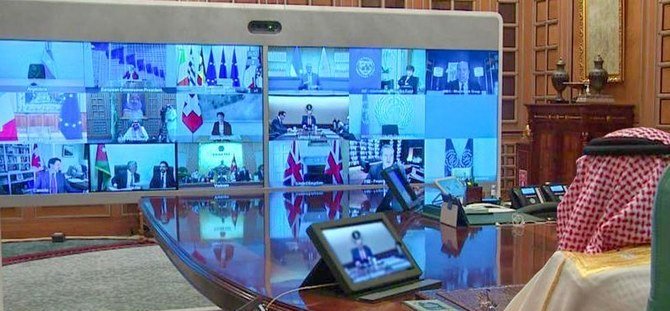
- ARAB NEWS
- 02 Jul 2025

As the COVID-19 pandemic spreads, 2020 could be the most important year for the G20 since the international financial crisis in 2008-09, when the group was widely perceived as having seized the mantle from the G7 as the premier forum for international economic cooperation and global governance.
This was reflected in last week’s video conference, when leaders logged in from the US, China, Germany, India, Japan, Indonesia, Australia, Russia, Brazil, the UK, Saudi Arabia, South Africa, Turkey, France, Italy, Germany, Canada, South Korea, Argentina, Mexico and the EU — territories accounting for about 90 percent of global GDP, 80 percent of world trade and 66 percent of the global population.
They committed to do “whatever it takes” to minimise the social and economic damage inflicted by the coronavirus, to assess gaps in pandemic preparedness, and to increase funding for research and development in funding for vaccines and medicines, an area in which the G20 has shown an active interest in the past.
The leaders also agreed to look to increase funding to multilateral bodies as required, and urged central bank governors and national finance ministers to draw up an action plan. They insisted they were united in their response, and would use all available policy tools to minimise the economic and social damage from the pandemic.
Despite this unity, there were tensions. Chinese President Xi Jinping, for instance, is in a battle for international public opinion with US President Donald Trump over the source of the outbreak; Trump calls it the “Chinese virus” and US Secretary of State Mike Pompeo the “Wuhan flu.” Xi focused his remarks on US trade barriers rather than a domestic Chinese fiscal stimulus as the best route to growth, and urged leaders to enable international trade.
While the G20 has not yet lived up to some of the expectations of it, it continues to be a forum prized by its members, as last week’s session showed
Andrew Hammond
There are also concerns about how easy it will be to implement the agenda agreed on Thursday. The communique set no specific commitments, such as deferring debt repayment by the world’s poorest countries, as sought by the World Bank and the International Monetary Fund. This underlines the G20’s failure to realize the full scale of the ambition some thrust upon it at the height of the international financial crisis, in part because it has no formal mechanisms to ensure enforcement of agreements by world leaders.
Some states outside the G20 have concerns about its composition. Members were nominally selected according to criteria such as population and GDP —but Nigeria, sometimes called the “giant of Africa,” has three times South Africa’s population.
Former Norwegian foreign minister Jonas Gahr Store has gone so far as to call the G20 one of the greatest setbacks since the Second World War, because it undermines the UN’s universal sense of multilateralism. Reflecting this, the UN General Assembly convened a rival, alternative UN Conference on the Global Economic Crisis in 2009. This issue was also picked up by former UK prime minister Gordon Brown,who urged the G20 and the UN to work much more closely together to tackle the pandemic.
While the G20 has not yet lived up to some of the expectations of it, it continues to be a forum prized by its members, as last week’s session showed. This year’s G20 could be especially important, given the rapid spread of coronavirus, which requires key countries, especially the US and China, to work much more in concert if an optimal global response is to be deployed.
*Andrew Hammond is an Associate at LSE IDEAS at the London School of Economics